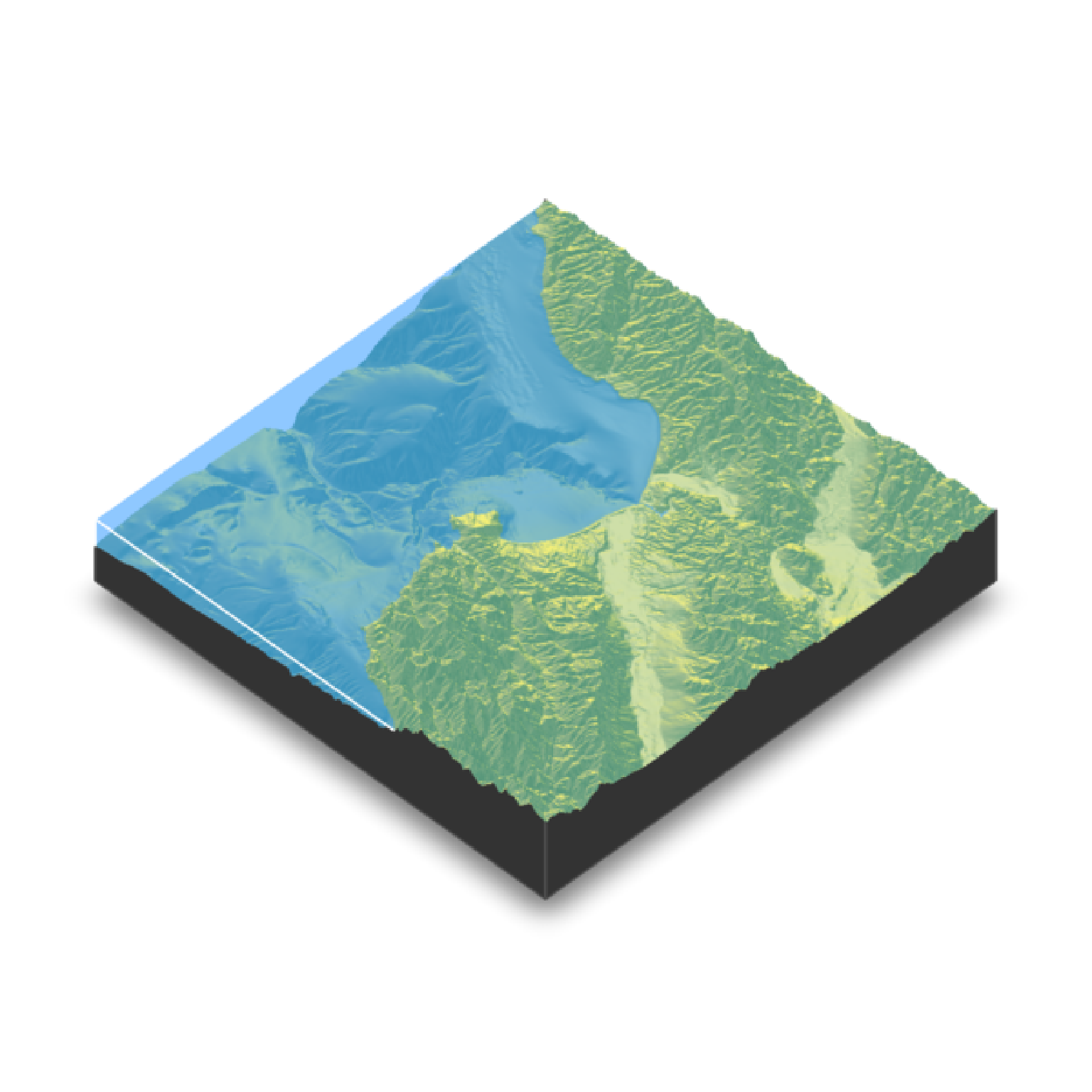Changes the position and properties of the camera around the scene. If no values are entered, prints and returns the current values.
render_camera(
theta = NULL,
phi = NULL,
zoom = NULL,
fov = NULL,
shift_vertical = 0
)Arguments
- theta
Defaults to current value. Rotation angle.
- phi
Defaults to current value. Azimuth angle. Maximum
90.- zoom
Defaults to current value. Positive value indicating camera magnification.
- fov
Defaults to current value. Field of view of the camera. Maximum
180.- shift_vertical
Default
0. Amount to shift the viewpoint.
Examples
if(run_documentation()) {
montereybay |>
sphere_shade() |>
plot_3d(montereybay,zscale = 50, water = TRUE, waterlinecolor="white")
render_snapshot()
}
 #Shift the camera over and add a title
if(run_documentation()) {
render_camera(theta = -45, phi = 45)
render_snapshot(title_text = "Monterey Bay, CA",
title_bar_color = "grey50")
}
#Shift the camera over and add a title
if(run_documentation()) {
render_camera(theta = -45, phi = 45)
render_snapshot(title_text = "Monterey Bay, CA",
title_bar_color = "grey50")
}
 #Shift to an overhead view (and change the text/title bar color)
if(run_documentation()) {
render_camera(theta = 0, phi = 89.9, zoom = 0.9)
render_snapshot(title_text = "Monterey Bay, CA",
title_color = "white",
title_bar_color = "darkgreen")
}
#Shift to an overhead view (and change the text/title bar color)
if(run_documentation()) {
render_camera(theta = 0, phi = 89.9, zoom = 0.9)
render_snapshot(title_text = "Monterey Bay, CA",
title_color = "white",
title_bar_color = "darkgreen")
}
 #Shift to an front view and add a vignette effect
if(run_documentation()) {
render_camera(theta = -90, phi = 30,zoom = 0.8)
render_snapshot(title_text = "Monterey Bay, CA",
title_color = "white",
title_bar_color = "blue",
vignette = TRUE)
}
#Shift to an front view and add a vignette effect
if(run_documentation()) {
render_camera(theta = -90, phi = 30,zoom = 0.8)
render_snapshot(title_text = "Monterey Bay, CA",
title_color = "white",
title_bar_color = "blue",
vignette = TRUE)
}
 #Change the field of view (fov) and make the title bar opaque.
if(run_documentation()) {
render_camera(theta = -90, phi = 30,zoom = 0.5,fov = 130)
render_snapshot(title_text = "Monterey Bay, CA",
title_color = "black",
title_bar_alpha = 1,
title_bar_color = "lightblue",
vignette = TRUE)
}
#Change the field of view (fov) and make the title bar opaque.
if(run_documentation()) {
render_camera(theta = -90, phi = 30,zoom = 0.5,fov = 130)
render_snapshot(title_text = "Monterey Bay, CA",
title_color = "black",
title_bar_alpha = 1,
title_bar_color = "lightblue",
vignette = TRUE)
}
 #Here we render a series of frames to later stitch together into a movie.
if(run_documentation()) {
phivec = 20 + 70 * 1/(1 + exp(seq(-5, 10, length.out = 180)))
phivecfull = c(phivec, rev(phivec))
thetavec = 270 + 45 * sin(seq(0,359,length.out = 360) * pi/180)
zoomvechalf = 0.5 + 0.5 * 1/(1 + exp(seq(-5, 10, length.out = 180)))
zoomvec = c(zoomvechalf, rev(zoomvechalf))
for(i in 1:360) {
render_camera(theta = thetavec[i],phi = phivecfull[i],zoom = zoomvec[i])
#uncomment the next line to save each frame to the working directory
#render_snapshot(paste0("frame", i, ".png"))
}
#Run this command in the command line using ffmpeg to stitch together a video:
#ffmpeg -framerate 60 -i frame%d.png -vcodec libx264 raymovie.mp4
#And run this command to convert the video to post to the web:
#ffmpeg -i raymovie.mp4 -pix_fmt yuv420p -profile:v baseline -level 3 -vf scale=-2:-2 rayweb.mp4
#Or we can use render_movie() to do this all automatically with type="custom" (uncomment to run):
#render_movie(filename = tempfile(fileext = ".mp4"), type = "custom",
# theta = thetavec, phi = phivecfull, zoom = zoomvec, fov=0)
}
#Here we render a series of frames to later stitch together into a movie.
if(run_documentation()) {
phivec = 20 + 70 * 1/(1 + exp(seq(-5, 10, length.out = 180)))
phivecfull = c(phivec, rev(phivec))
thetavec = 270 + 45 * sin(seq(0,359,length.out = 360) * pi/180)
zoomvechalf = 0.5 + 0.5 * 1/(1 + exp(seq(-5, 10, length.out = 180)))
zoomvec = c(zoomvechalf, rev(zoomvechalf))
for(i in 1:360) {
render_camera(theta = thetavec[i],phi = phivecfull[i],zoom = zoomvec[i])
#uncomment the next line to save each frame to the working directory
#render_snapshot(paste0("frame", i, ".png"))
}
#Run this command in the command line using ffmpeg to stitch together a video:
#ffmpeg -framerate 60 -i frame%d.png -vcodec libx264 raymovie.mp4
#And run this command to convert the video to post to the web:
#ffmpeg -i raymovie.mp4 -pix_fmt yuv420p -profile:v baseline -level 3 -vf scale=-2:-2 rayweb.mp4
#Or we can use render_movie() to do this all automatically with type="custom" (uncomment to run):
#render_movie(filename = tempfile(fileext = ".mp4"), type = "custom",
# theta = thetavec, phi = phivecfull, zoom = zoomvec, fov=0)
}